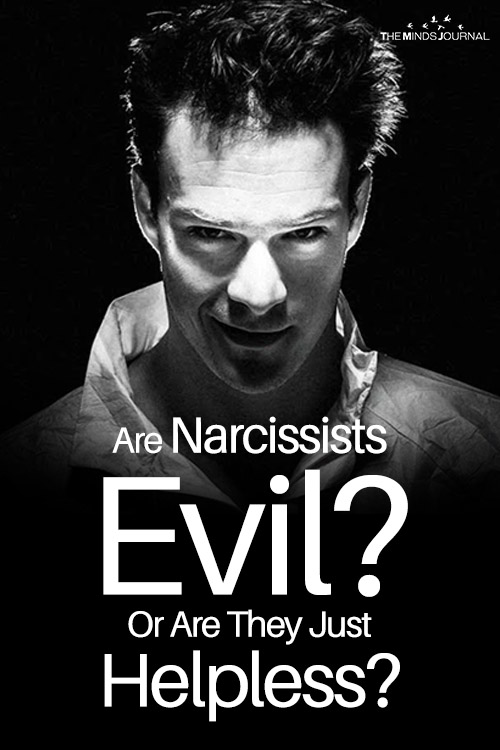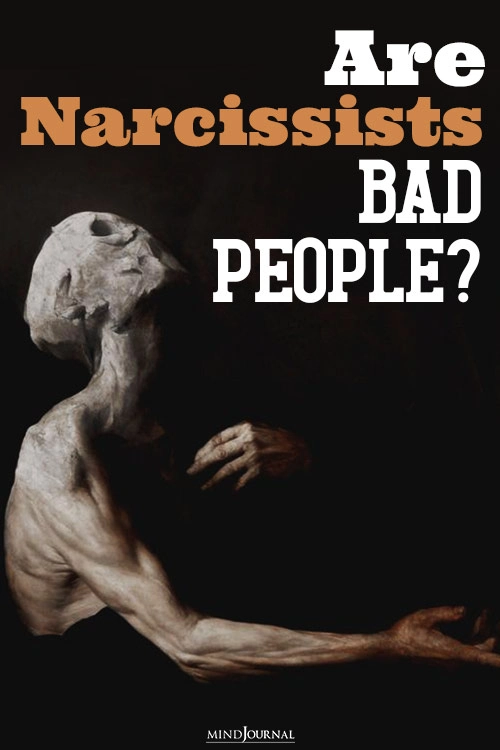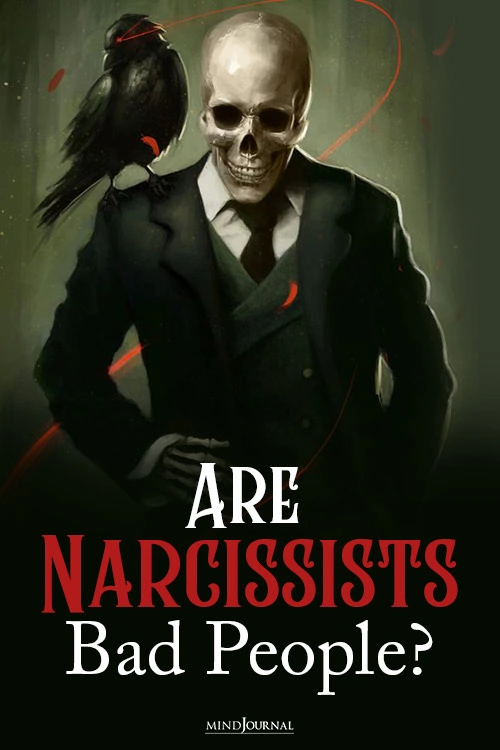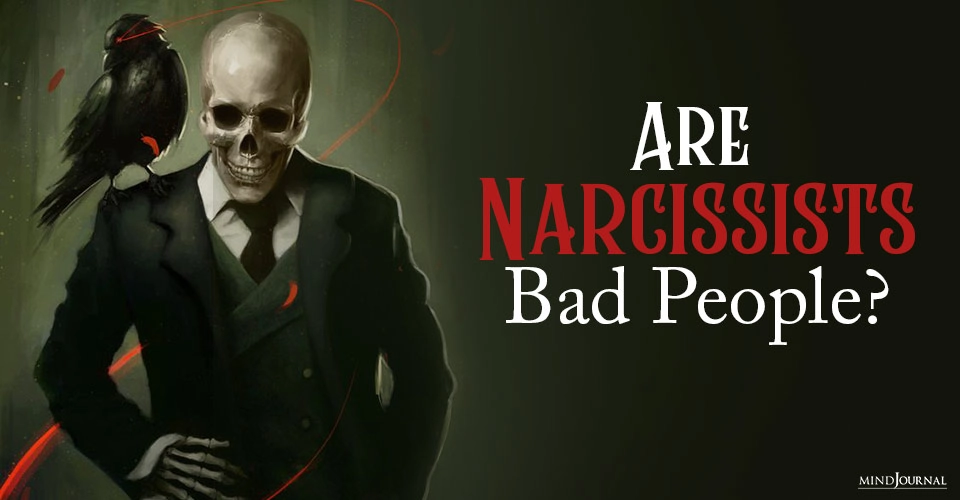Do narcissists realize that they are hurting us? Do they know that they are expert liars and manipulators? Do they have a good heart deep down? Can they change if they really wanted to? The answer to these questions is not easy to answer. The first thing you need to realize is all of us are unique and behave in very complicated ways. By Dr. Elinor Greenberg
Are Narcissists Bad People?
Do narcissists choose to hurt others or are they unable to control themselves? Most people who have been on the receiving end of narcissistic abuse have wondered just how much blame they should place on the narcissist. I am frequently asked:
Are people with narcissistic personality disorders simply bad people who choose to hurt others but could control themselves if they tried? Or are they good people who are doing the best that they can but cannot control themselves?
Unfortunately, there is no simple answer to this question. People are complex. I do not think we can simply label people with narcissistic adaptations as either good or bad. Nor can we always draw a clear line between what we can control and what is controlling us.
Even people without personality disorders are continually struggling to put their ego and personal desires aside and do what they know to be the right thing. Human nature has not changed in thousands of years.
Our struggle is aptly described by the Apostle Paul in Romans 7:19—For I do not do the good I want to do, but the evil I do not want to do—this I keep on doing.
So how does this apply to people with narcissistic personality disorders?
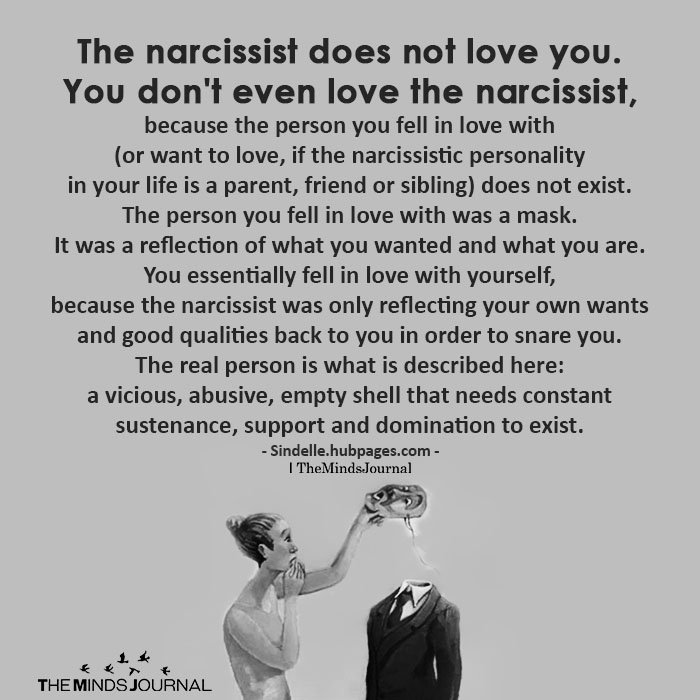
When I think of the variety of people who qualify for a diagnosis of NPD, I see quite a range of people—from those that want to be good people to those who do not care whom they hurt. Most narcissistic people fall somewhere in between, like the rest of us.
Related: Yes, Narcissists Can Change: Here’s How
Note: I am using the terms “narcissist” or “narcissistic” as a shorthand way of referring to people who exhibit a pattern of thinking and behavior that is commonly diagnosed as a narcissistic personality disorder. I personally prefer the term “narcissistic adaptation,” because it emphasizes that this pattern was initially a creative adjustment intended to maximize the amount of love, attention, and support the child would receive from his or her caregivers.
So why do people with narcissistic adaptations tend to do more harm in intimate relationships than most non-narcissists?
The “Good Narcissist”
Some people with NPD are trying their best to be good people but are handicapped by their narcissistic adaptation. Their extreme self-centeredness, lack of emotional empathy, and lack of “whole object relations” and “object constancy” distort their view of interpersonal situations.
A Few Brief Definitions Of The Above Terms Are Likely To Be Helpful To The Reader:
1. Whole object relations:
This is the ability to see yourself and other people in a realistic, stable, and integrated way that recognizes that everyone has both good and bad qualities and liked and disliked traits.
Without whole object relations, narcissists cannot form a stable integrated picture of anyone. They tend to place everyone into two basic boxes: Either they are special, perfect, unique, and entitled to special treatment (high status) or they are worthless, pathetic, garbage, and entitled to only what the “special people” choose to give them (low status).
2. Object constancy:
This is the capacity to maintain your positive emotional connection to someone when you feel hurt, angry, frustrated, or disappointed with them. It is also the ability to maintain this sense of connection with someone who is not physically present.
Without object constancy, narcissists can literally be saying “I love you” one moment, then 10 minutes later switch to “I hate you” because they did not like something you just said or did.
3. Emotional empathy:
This is the ability to feel another person’s joy or pain. Narcissists lack emotional empathy, so they have less feedback about the other person’s reactions and less reason to care. They do have “intellectual empathy,” the ability to think about what the other person is likely to be feeling. However, in the middle of a fight, they are highly unlikely to do this because of their lack of object constancy.
Most Of The Hurt That Narcissists Cause Is The Result Of Two Basic Sets Of Issues:
1. The need to retaliate to protect their self-esteem
Blame and retaliation:
During any sort of disagreement, or even a fairly neutral situation, as soon as narcissists start to feel bad, they are likely to see whomever they are with as responsible for their discomfort. They quickly move from blaming the other person to angrily retaliating.
Related: How You Can Protect Yourself From Self-Proclaimed And Fake Narcissism Experts
Justification:
They feel justified because, without whole object relations or object constancy, they now see the other person as the all-bad enemy. In addition, they have temporarily lost touch with any positive past history between them and the other person.
Fragile self-esteem:
Their fragile self-esteem makes it extremely painful for them to become aware of their part in causing a fight. They do not even try to see how they might be at fault because that would pierce their narcissistic defenses and result in them feeling imperfect and deeply shamed.
Difficulty apologizing:
After they calm down, they may realize that they over-reacted and regret it. Unfortunately, their underlying shaky self-esteem makes it very unlikely they will admit they were wrong and apologize. Instead, they are likely to make a reparative gesture, such as giving the person a present.
However, if the other person wants to talk about what happened, they are likely to become very defensive and feel attacked. Then the cycle of blame and retaliation and reparation may start all over again.
2. Self-centeredness and lack of emotional empathy
Narcissists often unintentionally do things that hurt other people because they are so self-centered and lack emotional empathy. For example, they may make fun of you in front of other people and just think they are being funny. Or you may tell them that you have a stomach virus and instead of sympathizing, they tell you that they had one much worse than yours.
Related: How You Can Protect Yourself From Self-Proclaimed And Fake Narcissism Experts
How Do We Judge Them?
Do we give them a free pass to hurt other people because they have a narcissistic personality disorder? I would not. At the very least, most well-intentioned people with NPD:
• Know that they are selfish.
• Know that other people are getting hurt by them.
• Know psychotherapy exists and most are choosing not to go for help to change.
• I have been told that what they are doing is hurtful and continue doing it anyway.
But: This subset of narcissists is not setting out to hurt other people on purpose.
The “Bad Narcissists”
These people are focused on getting whatever they want and are not trying to be “good people.” They really do not care who gets hurt by their actions. Some even enjoy causing other people pain and will go out of their way to make other people feel sad, inadequate, and inferior.
Different theorists call this type of narcissist by different names: “malignant,” “toxic,” or “devaluing.”
It is easy to judge them as bad because they do not express any regrets or make reparative gestures. They are hurting people intentionally to make themselves feel superior.
Bottom Line
People with narcissistic adaptations differ from one another in how much they want to be good people. The ones who want to be good try harder to follow a moral code. However, even when they are trying their hardest, their basic narcissistic issues—self-centeredness, unstable self-esteem, lack of emotional empathy, and lack of whole object relations and object constancy—will cause them to hurt those closest to them.
Written By Elinor Greenberg, Ph.D. Originally Appeared In Psychology Today
